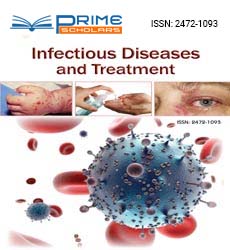Short Communication - (2023) Volume 9, Issue 5
Unravelling the Complexities of Infectious Diseases: A Battle for Human Health
Marc Baguelin*
Department of Infectious Disease, Imperial College London, United Kingdom
*Correspondence:
Marc Baguelin,
Department of Infectious Disease, Imperial College London,
United Kingdom,
Email:
Received: 01-May-2023, Manuscript No. IPJIDT-23-16898;
Editor assigned: 03-May-2023, Pre QC No. IPJIDT-23-16898 (PQ);
Reviewed: 17-May-2023, QC No. IPJIDT-23-16898;
Revised: 22-May-2023, Manuscript No. IPJIDT-23-16898 (R);
Published:
29-May-2023, DOI: 10.36648/2472-1093-9.5.50
Introduction
Infectious diseases have been an enduring challenge throughout
human history. From ancient plagues to recent global outbreaks,
these diseases have shaped societies, claimed lives,
and demanded continuous scientific and medical advancements.
Today, with the world still grappling with the ongoing
COVID-19 pandemic, understanding the complexities of infectious
diseases has become more crucial than ever. In this article,
we will explore the various facets of infectious diseases,
their causes, transmission, prevention, and the ongoing efforts
to combat them.
Description
These diseases can range from mild, self-limiting conditions to
severe, life-threatening illnesses. Examples include influenza,
tuberculosis, malaria, HIV/AIDS, and now COVID-19. Infectious
diseases have diverse origins and modes of transmission. Bacteria
and fungi can enter the body through cuts or wounds,
while viruses often spread through respiratory droplets or contaminated
surfaces. Parasites may be transmitted through insect
vectors, contaminated water, or food. Some diseases, like
COVID-19, can spread easily from person to person through
close contact, making them particularly challenging to contain.
Preventing infectious diseases is a multifaceted approach that
includes vaccination, hygiene practices, vector control, and
public health measures. Vaccines play a crucial role in preventing
diseases like polio, measles, and hepatitis, by training the
immune system to recognize and fight specific pathogens. Hygiene
practices such as hand washing, proper sanitation, and
safe food handling can significantly reduce the spread of infectious
agents. Vector control strategies target the organisms
that transmit diseases, such as mosquitoes in the case of malaria
or dengue fever.
Infectious diseases pose significant challenges due to their ability to evolve and adapt. Bacterial resistance to antibiotics
is a growing concern, rendering once-effective treatments ineffective.
Viruses can mutate rapidly, potentially leading to the
emergence of new variants that evade immunity or are more
transmissible. Zoonotic diseases, which are transmitted between
animals and humans, like COVID-19, Ebola, and SARS,
highlight the need for better surveillance, early detection, and
response systems to mitigate future outbreaks. International
organizations such as the World Health Organization (WHO)
and the Centers for Disease Control and Prevention (CDC)
play a crucial role in coordinating efforts to combat infectious
diseases. These organizations provide guidance, conduct research,
and facilitate collaboration between countries. Their
work includes disease surveillance, outbreak investigation,
and the development of strategies for prevention and control.
The field of infectious disease management has witnessed remarkable
advancements in recent years. Molecular diagnostics
techniques allow for rapid identification of pathogens, enabling
timely and targeted interventions. Next-generation sequencing
has revolutionized the study of viral genomes, aiding
in the surveillance and characterization of outbreaks. Artificial
intelligence and machine learning algorithms help analyze vast
amounts of data, identify patterns, and predict disease spread,
empowering decision-makers with valuable insights.
The COVID-19 pandemic has been a stark reminder of the
devastating impact infectious diseases can have on societies
and economies. It has underscored the importance of robust
healthcare systems, effective communication, and global cooperation.
The development of multiple vaccines in record
time has showcased the power of scientific collaboration and
innovation in the face of a global health crisis. Enhancing global
preparedness for infectious diseases is critical. This includes
investing in research and development of new therapies, improving
healthcare infrastructure and capacity, strengthening
surveillance systems, and promoting public health education.
Additionally, it is essential to address social determinants of
health, such as poverty, inequality, and access to healthcare,
as these factors influence disease transmission and outcomes.
Looking to the future, emerging technologies like gene editing,
nanotechnology, and advanced data analytics hold promise in
revolutionizing disease prevention and treatment. However,
ethical considerations, regulatory frameworks, and equitable
access must be at the forefront of these advancements [1-4].
Conclusion
Infectious diseases continue to pose significant threats to human
health and well-being. Understanding the causes, transmission,
and prevention of these diseases is crucial in mitigating
their impact. Through collaboration between governments,
international organizations, scientists, and communities, we
can combat infectious diseases and work towards a healthier,
more resilient future. Investing in research, healthcare systems,
and preparedness will be key in safeguarding global populations
from the ever-evolving challenges posed by infectious
diseases.
Acknowledgement
None.
Conflict Of Interest
The author declares there is no conflict of interest in publishing
this article.
References
- Kahn JS, McIntosh K (2005) History and recent advances in Coronavirus discovery. J Pediatr Infect Dis 24 (11 Suppl): S223–S226.
[Crossref] [Google Scholar]
- Wu YC, Chen CS, Chan YJ (2020) The outbreak of Covid-19: An overview. JCMA 83(3): 217–220.
[Crossref] [Google Scholar]
- Larsen JR, Martin MR, Martin JD (2020) Modeling the onset of symptoms of Covid-19. Front Pub Heal 8: 473.
[Crossref] [Google Scholar]
- Baj J, Karakuła-Juchnowicz H, Teresiński G (2020) Covid-19: Specific and non-specific clinical manifestations and symptoms: The current state of knowledge. J Clin Med 9(6): 1753.
[Crossref] [Google Scholar]
Citation: Baguelin M (2023) Unravelling the Complexities of Infectious Diseases: A Battle for Human Health. J Infect Dis Treat.
9:50.
Copyright: ©2023 Baguelin M. This is an open-access article distributed under the terms of the Creative Commons Attribution
License, which permits unrestricted use, distribution, and reproduction in any medium, provided the original author and source
are credited.
